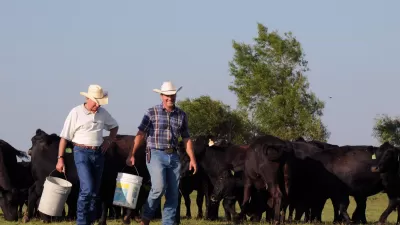That's how many are expected to inhabit the world by 2050. Experts worry over looming food shortages.
"The possibility of a world food shortage is causing more and more concern. 'It's likely to get worse in coming years,' reckons Mr. Chamie, now research director at the Center for Migration Studies, a New York think tank."
"His fear is partly based on the fact that the world's population is growing by about 78 million people a year, with projections of an additional 2.5 billion people by 2050 – a generation away."
"'The most significant event of the 20th and 21st century is the growth of world population,' Chamie says. 'It has affected every life form on this planet.'"
"The present situation, however, is different, says Lester Brown, president of the Earth Policy Institute in Washington. It's based on trends, not specific incidents. Longer-term trends include the growing world population and the desire of huge numbers of increasingly prosperous people in China, India, and elsewhere to eat more meat and eggs. A shorter-term problem, he says, is the growing use of corn and other foods to distill biofuels for cars, trucks, and other energy uses."
"Unless the food-shortage situation is tackled seriously and quickly, the world faces increased social unrest, food riots, political instability, and more failed states, notes Mr. Brown. 'Civilization is now at risk,' he says."
FULL STORY: Can the earth provide enough food for 9 billion people?

Alabama: Trump Terminates Settlements for Black Communities Harmed By Raw Sewage
Trump deemed the landmark civil rights agreement “illegal DEI and environmental justice policy.”

Study: Maui’s Plan to Convert Vacation Rentals to Long-Term Housing Could Cause Nearly $1 Billion Economic Loss
The plan would reduce visitor accommodation by 25% resulting in 1,900 jobs lost.

Planetizen Federal Action Tracker
A weekly monitor of how Trump’s orders and actions are impacting planners and planning in America.

Wind Energy on the Rise Despite Federal Policy Reversal
The Trump administration is revoking federal support for renewable energy, but demand for new projects continues unabated.

Passengers Flock to Caltrain After Electrification
The new electric trains are running faster and more reliably, leading to strong ridership growth on the Bay Area rail system.

Texas Churches Rally Behind ‘Yes in God’s Back Yard’ Legislation
Religious leaders want the state to reduce zoning regulations to streamline leasing church-owned land to housing developers.
Urban Design for Planners 1: Software Tools
This six-course series explores essential urban design concepts using open source software and equips planners with the tools they need to participate fully in the urban design process.
Planning for Universal Design
Learn the tools for implementing Universal Design in planning regulations.
Caltrans
Smith Gee Studio
Institute for Housing and Urban Development Studies (IHS)
City of Grandview
Harvard GSD Executive Education
Toledo-Lucas County Plan Commissions
Salt Lake City
NYU Wagner Graduate School of Public Service



























